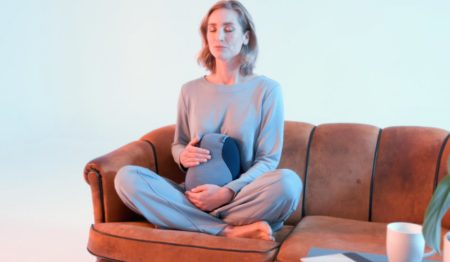
by Baginda Tirtadji | Tuesday, August 30, 2022 | Features, Product, Sleep
Today we introduce to you the newest function for Somnox 2: Airplane Mode
What Is Airplane Mode?
Almost all smartphones and electronic devices nowadays have a setting called ‘airplane mode’. This name has come about as the function was primarily launched in the aviation industry. The function makes sure that all Bluetooth, WiFi and other data traffic on your electronic device switches off. However, you can still use your Somnox when airplane mode is enabled.
What Happens When I Enable Airplane Mode?
By enabling airplane mode, both Bluetooth and WiFi on your Somnox switch off. This means that you can no longer connect your Somnox to the mobile app. However, you can still enjoy your breathing program or exercise and Somnox sounds as on your Somnox saves these settings by itself.
When your Somnox is turned on, it is continually searching for a connection in the background. This uses battery power. By enabling airplane mode, your Somnox uses less battery power so that you can enjoy your Somnox longer.
And we all know: more Somnox = more rest!
Curious to know how you can enable airplane mode on your Somnox?
Read all about it!
Tip: Try airplane mode on route to your next destination!

by Baginda Tirtadji | Friday, August 5, 2022 | Breathing, Research, Sleep
Controlling the speed of your heartbeat sounds like something only achievable by meditation masters. In reality, it’s something anyone can do simply by altering their breathing pattern. This is known as heart coherence, also known as cardiac coherence.
In this article, we’ll be covering everything you need to know about heart coherence, including what it is, how breathing affects it, and how it can support your wellness.
What Is Heart Rate Variability?
To understand heart coherence, you must first understand heart rate variability (HRV). HRV is the variance of time between heartbeats. If your heart rate is 60 beats per minute, it’s not actually beating once every second. For example, within a minute, there might be 0.9 seconds between two beats and 1.10 seconds between two others.
What Is Heart Coherence?
Heart coherence is a particular pattern of heart rate variation, where heart rate changes in sync with the breath—speeding up on the inhalation and slowing down on the exhalation. It aims to achieve balance between the sympathetic nervous system (“fight or flight”) and the parasympathetic nervous system (“rest and digest”), so that a person is neither a ball of nerves nor completely unresponsive to danger—just perfectly balanced in between.
Heart coherence is characterized by a highly ordered, smooth heart rhythm pattern. On a graph, it looks like smooth waves of roughly the same height bobbing up and down. Coherence doesn’t necessarily involve a reduction in HRV. It might even produce an increase in HRV at times.[*]
Physiologically, heart coherence is experienced as a calm and balanced, yet energized and responsive state that’s conducive to efficient everyday functioning, including the performance of tasks, focus, problem-solving, decision making, physical activity, and coordination.
How Does Breathing Affect Heart Coherence?
So, how do you achieve this balanced state of heart coherence? With coherent breathing.
Breathing is a largely unconscious process, meaning it happens 24/7 in the background without you even having to think about it. What’s unique about breathing is that you can also bring it under conscious control.
As humans, our natural tendency is to breathe at a rate of two to three seconds per inhale and exhale. With coherent breathing, the goal is to extend the length of both the inhale and exhale to about six seconds.[*]
How to start with coherent breathing:
- Breathe in and out:
- Breathe in for four seconds
- Breathe out for four seconds
- Do this for one minute
- Repeat this, but in your second minute, extend inhales and exhales to five seconds
- Repeat again, extending further to six seconds
By consciously adopting this slow, rhythmic breathing pattern, you can change your heart’s rhythm, initiating a shift out of a stressful emotional state into one of increased balance (or coherence).
Why Is Heart Coherence Important?
As you’ve probably noticed, your heart rate speeds up when you’re in a stressful situation. This is the result of the sympathetic nervous system, which is responsible for triggering the “fight or flight” response. As such, it’s clear that your heart reacts to how you feel.
What’s interesting is that research now tells us that the opposite is also true: your heart’s rhythmic activity can directly influence how you feel.[*] When your heart rate speeds up, it sends signals to your brain telling it that you’re in danger, triggering feelings of stress and anxiety. By fostering a slower, more rhythmic heart rate pattern using your breath, you send a signal back to your brain, telling it that you’re safe. This activates the opposite branch of the autonomic nervous system—the parasympathetic nervous system (or “rest and digest”).
Research about the effects of coherent breathing is still in its infancy, however, the available studies are fascinating and promising. One study showed that coherent breathing may be helpful for reducing depressive symptoms.[*]
How Do You Achieve Heart Coherence with Breathing?
Practicing breathing exercises for heart coherence is like weight training for your nervous system. Through your breathing exercises, you’ll learn what it feels like to be in the calm yet responsive state of heart coherence. With practice, you’ll be able to quickly bring forth this state in your day-to-day life, simply by using your breath. Eventually, heart coherence can become your default state, allowing you to approach the world from a consistent state of balance.
Practicing coherent breathing is simple with the help of Somnox, a jelly bean-shaped companion that mimics human breathing. Using robotic technology, this science-based device expands and deflates as if it’s taking deep, belly breaths.
By simply cradling Somnox, you’ll unconsciously adopt the same slower-paced breathing rhythm. In turn, your heart rate will synchronize to your slowed-down respiration rate, bringing you into a balanced state of heart coherence. Click here to watch a video of Somnox founder, Julian Jagtenberg, demonstrating how breathing with Somnox leads to heart coherence.
Somnox can be used any time of day, but it’s particularly beneficial to use just before going to bed for a restful night’s sleep or just after waking up to set the tone for a peaceful, productive day.
To achieve heart coherence, you can use the ‘Coherence’ breathing exercise within the Somnox app.
How to use:
- Hold Somnox 2, turn it on, and set it to the above settings.
- With the feature Somnox Sense turned on, smart sensors respond to your breathing in real-time, matching your rhythm and gradually adjusting it to the ideal rate.
- Feel your nerves relax, tension release, and your heart rate regulate.
- If you’re using it for sleep, continue deeply breathing until you fall asleep. With the help of Somnox 2, you’re sure to fall asleep quickly, stay asleep, and wake up feeling rested.
Take our online sleep test to determine if Somnox is right for you.
A Final Word
As you now understand, controlling your heart rate isn’t something reserved for meditation gurus. Anyone can achieve heart coherence by practicing coherent breathing.
In the harmonious state of heart coherence, your heart, mind, and body align, helping you achieve a state of autonomic nervous system equilibrium. From this balanced state, you can better approach the world with positivity, enthusiasm, and calm confidence.

by Baginda Tirtadji | Friday, August 5, 2022 | Breathing, Research, Sleep
Whether it’s listening to a meditation app or attending a yoga class, one thing’s for sure—deep breathing is always on the menu.
The simple act of inhaling deeply before letting the breath out in the same, slow, controlled manner benefits your brain in more ways than one. From improving your attention span to reducing your stress levels, we show you the science-backed effects of deep breathing on the brain.
What is deep breathing?
Deep breathing is known as diaphragmatic breathing. When done correctly, the stomach does all the work—expanding and rising with each inhale, then contracting and falling with each exhale—rather than the chest.
That’s why deep breathing is also called “belly breathing” or “abdominal breathing.”
During diaphragmatic breathing, every inhalation and exhalation takes roughly five seconds each. That’s about 5-6 deep breaths per minute if you’d like to keep count.
What are the effects of deep breathing on the brain?
According to science, there are quite a few ways deep breathing benefits your brain. So, sit back and take notes as we go through the main ones below.
Reduces stress and anxiety
Stress isn’t just part of the modern human’s vocabulary—for many of us, we live and breathe it. Unfortunately, chronic stress can lead to anxiety and worsen other aspects of your mental health.
Deep breathing is one way to stop chronic stress in its tracks. To understand how that works, we have to look at an important brain structure called the hypothalamus.
If you’re new to the term, think of the hypothalamus as the headquarters of the body’s autonomic nervous system (ANS), which consists of:
- The parasympathetic nervous system (PNS), aka the “rest-and-digest” or “feed-and-breed” response, and,
- The sympathetic nervous system (SNS), aka the “fight-or-flight” response
So, how does deep breathing affect the brain? Apparently, slow, deep breaths encourage the PNS to overtake the SNS via the vagus nerve. It’s the longest nerve connecting the brain to different parts of the body. Scientists refer to the vagus nerve’s activity as vagal tone.
A high vagal tone is recommended as it makes you more resilient to stress. One way to measure your vagal tone would be through heart rate variability (HRV). The higher the HRV, the higher your vagal tone. In fact, scientists think “HRV is a marker of healthy aging associated with stress management” in older adults.
You can increase your HRV simply by slowing down your breaths. Consciously shifting your focus to the frequency of your breathings sparks a series of changes inside your brain:
- Diaphragmatic breathing stimulates the vagus nerve. This helps to soothe parts of the brain that trigger the “fight-or-flight” responses during times of stress.
- Using EEGs to picture what goes on beneath the scalp, researchers found increased alpha power and decreased theta brain waves with belly breathing. In human-speak, that means less stress, anxiety, depression, anger, and confusion.
Improves attention span
After a bad night of sleep, you may feel brain fog, mental lethargy, or whatever you call it. Many of us are then guilty of letting our minds wander off the next day when we should be focused on the task at hand.
If that sounds like you, deep breathing may be one way to improve your attention span and boost your productivity.
In a 2017 study, participants that underwent 20 sessions of diaphragmatic breathing over eight weeks leveled up their attention and focus compared to those that didn’t. Bonus: The deep-breathing group also showed lower levels of another stress hormone, cortisol, and experienced less negative affect (feeling and expressing negative emotions like anger and fear).
Even if you only have 15-20 minutes per day for deep breathing in the form of meditation, science shows that’s enough to improve your attentiveness and self-regulation.
But how does deep breathing help you develop laser focus?
Scientists found the answer in experienced meditators that engaged in diaphragmatic breathing during their practice. Breathing deeply from the belly increased activity in the brain regions responsible for self-monitoring and cognitive control. So you can use belly breathing every time you feel you need to control your behavior. In other words, you’ve boosted your self-discipline to say no to doughnuts while dieting (#win).
At the same time, the brain areas that default to mind-wandering were deactivated. Better mental focus naturally means you’re more productive at work (and in other aspects of life), allowing you to achieve your goals more effortlessly.
Improves oxygen levels in the brain
Deep breathing patterns can also improve the oxygen levels in your brain.
A small-scale study analyzed how belly breathing changed the ventilation and oxygen saturation in patients with chronic obstructive pulmonary diseases (progressive lung diseases).
In the first four minutes, the participants breathed normally as they would outside of the experiment. Next, they practiced deep breathing for two minutes. They then finished off with another four minutes of natural breathing.
The results from this 10-minute breathing session were astounding. The study found that deep breathing:
- Significantly broadened tidal volume—the amount of air moving in and out of the lungs during each breath
- Enhanced ventilation efficiency, in which dead space (air that does not reach the air sacs) is reduced
- Increased oxygen levels in the bloodstream
For these reasons, deep breathing is recommended for people with lung issues. More than that, healthy people can benefit equally, if not more, from this slow-breathing technique.
Enhances overall brain health
For a relatively small organ, the brain is a big user of oxygen—roughly 20% of your body’s total oxygen supply! The brain also thrives on sleep, as this is the time when it removes toxins through your body’s glymphatic system (a waste-clearing ecosystem).
Unfortunately, the commonly used chest-breathing method means your body and, in turn, your brain isn’t optimizing its oxygen supply. What’s more, much of society is chronically sleep-deprived. That means for many of us, our brains don’t take out the trash every night, so to speak. This leads to a toxin buildup in one of the most vital internal organs.
Deep breathing tackles these problems two-fold:
- As mentioned earlier, belly breathing makes oxygen absorption more efficient for your body and brain so that the latter gets enough oxygen to be in top form.
- Deep breathing, when combined with good sleep hygiene and relaxation techniques (like meditation), may help you fall asleep at your bedtime and fall back to sleep when you awake during the night, a 2018 study highlighted. This gives your brain ample time to rid itself of toxins and maintain optimal functioning.
Deep breathe your way to a healthier brain
From better attention span to higher oxygen levels, you can breathe your way to a healthier brain simply by deepening your very next breath.
To ensure you’re deep-breathing correctly—breathing from your belly and not the chest—use a tool like Somnox.
This snuggleable breath and sleep companion helps synchronize your breathing patterns to reap the full benefits of diaphragmatic breathing. It’s as simple as turning it on and letting the smart sensors adjust your breathing rhythm for deeper breaths. This will help you relax and reduce stress – and help you fall asleep easier.
Not sure if Somnox is right for you? Take our online sleep test to find out.

by Baginda Tirtadji | Monday, August 1, 2022 | Breathing, Features, Sleep
Life is hectic. That’s why at Somnox, we’re always looking for ways to make your world a little more tranquil. And now you can soothe yourself to sleep with the sound of your favorite music, thanks to our newest feature: Audio Streaming for Somnox 2. Now available for iPhone and iPad users.
Our users love Somnox for relaxation and sleep. That’s what Somnox is all about, after all. But we asked ourselves: how can we improve your Somnox experience even more? Following a recent user survey of hundreds of Somnox users, the answer was clear: with more customization, of course!
Design your own experience
Evidence shows that music combined with breathing has a calming effect. And while the Somnox app comes with a variety of soothing sounds to enjoy, we know that more customization = better. So now you can personalize your moment of relaxation. Play your favorite music, sounds, meditations, podcasts, or audiobooks wirelessly on your Somnox 2 from your iPhone or iPad.
Android users, don’t despair! We’re working on this for you next.

How can I stream my audio on Somnox 2?
To stream your own sounds, connect your phone or tablet via Bluetooth to the Somnox 2 speaker. On your device, you can then choose the audio you want to play in a program of your choice such as Youtube or Spotify.
To stream your own sounds:
- Connect your iPhone or iPad via Bluetooth to the Somnox 2 speaker.
- On your device, you can then choose the audio you want to play in any app that plays audio like Youtube, Spotify, or Apple Music.
- Somnox plays automatically! Enjoy!
What can I play on my Somnox 2?
With audio streaming via Bluetooth, it is now possible to play your own sounds. This includes anything you can play off your iPhone and iPad.
Stream music for meditation on YouTube or your favorite calming music playlist on Spotify. If you’re someone who finds listening to audiobooks calming, you’re in luck! Audiobooks can also be streamed on your Somnox 2. Play whatever it is you need to relax, day or night.
By combining audio streaming with a personal program in the Somnox app, you can relax even more and deepen your breathing exercises. For example, you can create a custom breathing program to go with your meditation. This way, you can tailor Somnox to your needs.
Click here to learn how to set up your own breathing program.
Our favorite playlists to unwind to
To give you some inspiration, we asked our team here at Somnox some of their favorite calming sounds. From there, we made this collection of playlists and meditations that help us unwind. This way you can get a good start on streaming audio.
Try these playlists or create your own. If you want to share your favorite sounds to relax with the Somnox community, join our Facebook community @SomnoxSleep. Happy listening!

by Baginda Tirtadji | Friday, July 29, 2022 | Breathing, Research, Sleep
Do you know what goes on in your brain when you sleep? Most people recognize that they feel better after a good night’s sleep. But what many people don’t realize is just how essential sleep is for cognitive function and overall health. In this blog post, we will discuss the benefits of sleep, the harm of not sleeping, and what happens to your brain when you snooze!
Your brain is highly active while you sleep
Did you know that there is tons of brain activity going on as you sleep? It’s different from the brain activity that goes on while you’re awake. When you sleep, your brain is working hard to process information and consolidate memories. This is why healthy sleep patterns are so important for learning and retaining information.
Sleep deprivation can have serious effects on brain function including consequences for working memory, attention, and emotional reactions. That’s why it’s important to address sleep disorders if you experience chronic trouble sleeping.
To understand sleep better, let’s look at the five stages of sleep.
What are the stages of sleep?
Through electroencephalogram (EEG) recordings that measure brainwaves, scientists have discovered our brains go through different sleep stages during a night of sleep. The brain produces brain waves of different frequencies during each stage of sleep. Each type of frequency is associated with a different stage of sleep.
NREM vs REM sleep
You’ve probably heard the terms REM and non-REM (NREM) sleep before. But what are REM and NREM exactly?
REM sleep is a stage of sleep associated with Rapid Eye Movements, to put it simply. The non-REM sleep stage is associated with little to no eye movement. Why is this important?
During NREM sleep, the brain is less active and the brain waves slow down whereas, during REM, brain waves are more active. NREM is considered a lighter stage of sleep while REM is considered deep sleep.
The 5 sleep stages
There are five stages of sleep. The first stage actually is not sleep at all, it’s what happens right before you sleep: wakefulness. Then there are three stages of progressively deepening non-REM (NREM) sleep stages followed by a REM deep sleep stage.
Once the brain has passed through all NREM stages plus REM, this is considered one “sleep cycle”. Each cycle lasts about 90 to 110 minutes. The brain will pass through around four to five sleep cycles on an average night of sleep. NREM sleep makes up about 75% of our total sleep time while REM makes up about 25%.
The sleep cycles are as follows:
- N1: Stage one is light sleep
- N2: Stage two is deeper sleep
- N3: Stage three is the deepest level of NREM sleep
- REM: Stage four is when the brain becomes highly active
The important thing for you to know about sleep stages and sleep cycles is that each time your brain passes through a sleep cycle during the night, the REM stage becomes longer each time. In other words, you will spend more time in REM sleep and less time in non-REM sleep as the night progresses.
So, why is REM sleep important?
The importance of REM sleep
Sleep specialists and health experts talk about REM sleep all the time. But what makes REM sleep so important?
During REM sleep, your brain waves appear similar to when you’re awake and your eyes move quickly in different directions. Your breathing and heart rate also increase while your muscles become temporarily paralyzed. REM sleep is also associated with vivid dreaming.
REM sleep allows our brains to consolidate memories and information and improve focus. It also has benefits for the immune system, helping you to stay healthy. Reduced REM sleep is associated with conditions such as high blood pressure and diabetes.
How lack of sleep affects the brain
Getting insufficient sleep does not simply mean you don’t get the good benefits of sleep. Not getting enough sleep can actually be harmful to cognitive and emotional functions.
When you’re sleep-deprived, it’s harder to focus, react quickly, or remember information. Sleep-deprived people tend to get more emotional and have less patience. Lack of sleep also can lead to slower reaction times (putting you at higher risk of accidents) and affects learning.
Research shows that sleep plays a huge role in memory consolidation, mental health, and the brain’s ability to process information.

How does sleep affect emotional well-being?
While sleep is essential for cognitive functions, it is also crucial for your emotional health. During sleep, there is increased activity in the amygdala, the part of the brain responsible for processing emotions. This may explain why dreams often have an emotional component.
You don’t need to be a sleep expert to know that how you sleep affects your mood the next day. This is because sleep, especially rapid-eye movement REM sleep, plays an important role in regulating and processing emotions.
Some researchers have theorized that sleep promotes connectivity between the amygdala (the structure in the brain that’s responsible for emotion) and the prefrontal cortex (the area of the brain that controls executive functioning).
Therefore, when you get normal sleep, you are better able to regulate your emotions because they are under the executive control of your prefrontal cortex. Conversely, when you don’t get enough sleep, the prefrontal cortex has a harder time regulating the amygdala and you may have difficulty controlling your emotions.
Sleep and mental health
Chronic sleep deprivation has been demonstrated to be strongly linked to mental health issues and psychological distress. Around 40% of people experiencing chronic insomnia also suffer from a mental health disorder.
Sleep deprivation can cause changes in brain function and neurotransmitter activity which can lead to moodiness, anxiety, and irritability.
Insomnia has been recognized as a risk factor for major depression and dysthymia, which is defined as persistent mild depression. There is sleep research that suggests the relationship between insomnia and mental health disorders can go both ways: mental health disorders can be both a risk factor and a consequence of disordered sleep.
How does the brain control the sleep-wake cycle?
The hypothalamus is the region in your brain that contains a group of nerve cells that act to regulate sleep. Specifically, the suprachiasmatic nucleus (SCN) is a group of brain cells that control the circadian rhythm.
Other structures in the brain that are responsible for the sleep-wake cycle include the brain stem, thalamus, pineal gland, basal forebrain, and amygdala. We’ll briefly explain how each structure is involved:
- Thalamus: relays sensory information, is active during REM sleep but quiet during NREM sleep
- Pineal gland: produces the hormone melatonin which plays an integral role in sleep
- Basal forebrain: releases adenosine which acts as a nervous system depressant, can be counteracted by caffeine
- Amygdala: processes emotions and becomes active during REM sleep
Sleep is an essential aspect of overall health
Sleep is an essential part of our lives, yet it remains one of the most mysterious. We now know that our brains are highly active while we sleep and that lack of sleep can have a significant impact on mental health. The five stages of sleep play an important role in restoring energy, consolidating memories, and regulating emotions. REM sleep is especially critical for emotional well-being.
Luckily, it is possible to influence your sleep. Breathing plays a crucial role in improving your sleep quality. By slowing down your breathing, for example by doing a breathing exercise, you can relax your body and mind and fall asleep faster.
Today there are tools that exist to help you regulate your breathing. An example of such a tool is Somnox. This huggable sleep companion measures your breathing rate in order to regulate and slow down your breathing. You automatically enter a relaxed state of mind to help you enjoy a peaceful rest at night.
Curious to see if Somnox can help you sleep better? Take the sleep quiz to find out.







Recent Comments